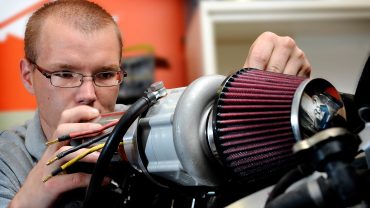Aerospace Engineering
The Master of Science in Aerospace Engineering supports students interested in earning a M.S. degree in 18 months. It is intended for students who have only one calendar year available to attend graduate school, who are working full time (attending part-time) or who want only one year of graduate coursework and will cover their own expenses.
The Master of Science in Aerospace Engineering addresses the needs of off-campus students whose schedule or location does not allow on-campus study. The online courses are identical to on-campus courses and are typically taught simultaneously.
Convenience and flexibility are key advantages of this program. The MSAE degree is a 30-credit-hour degree program that does not require a thesis, a final oral exam or on-campus attendance.
Benefits of the Degree
- Flexibility (time and place)
- No need for campus attendance
- Earn an engineering graduate degree from a well-established and recognized university
- Enhance your career opportunities
- Achieve new competencies, broaden your expertise and expand your knowledge
Non-Degree Studies (NDS) Students
NDS students seeking spring enrollment in an Engineering online program and/or course, please submit your NDS application (opens in new tab) no later than Wednesday, January 10th, 2024 to ensure your application materials are received on time. Submitting your application after January 10th, may result in not being admitted or enrolled in classes for the spring 2024 semester.
Eligibility
At the master's level, an applicant will meet the minimum admission requirements for full graduate standing if all of the following are satisfied:
- Overall grade point average (GPA) is at least 3.0 on a 4.0 scale from an accredited institution.
- Undergraduate major is in a technical area which satisfies the prerequisites for graduate coursework in MAE. If you do not hold a BS degree in ME or AE, you may need to complete undergraduate aerospace engineering courses prior to being accepted for admission.
- Three satisfactory letters of recommendation.
- An international master's applicant has a competitive TOEFL score (NC State Graduate School requirement: 18 or higher in each section with a total score of 80 in all four sections). This program does not currently accept international students who reside outside the continental U.S.
Plan of Study
The MSAE (non-thesis) student will select a program of study after meeting with an AE advisor. The curriculum will adhere to the following format:
- 6 MAE courses (18 credit hours)
- Up to 3 MAE-approved electives (9 credit hours)
- MAE 586 Project Work (3 credit hours)
- 30 credit hours total
This program is an Option B program as defined by the Graduate School, operates with a single advisor and requires neither an official final oral examination nor an officially designated minor. The program requires a Plan of Work on file and includes 30 semester hours. Course listings will be offered for the major areas of concentration. A faculty advisor, either selected by the student in consultation with a faculty member or appointed by the department, will guide the student through the program. In general, the MAE 586 faculty member will serve as the student's advisor. The Director of Graduate Programs should be consulted if a student is having difficulty identifying an advisor within the first three weeks of classes. An MS plan of work should be filed in the Graduate Office by the end of the first semester.
All students at NC State are required to maintain continuous registration until completion of their degree program. A procedure for formally requesting a leave of absence is available.
Teaching assistantships are not generally available for non-thesis master's students.
Career Prospects
Aerospace engineers design, build, repair and maintain aircraft, missiles and systems for national defense or spacecraft. Graduates of the Master of Science in Aerospace Engineering degree program typically find employment in manufacturing, analysis and design, research and development or the federal government.
Aerospace engineering is a unique field that requires very specific education and experience. As aerospace firms research and develop more sustainable and cost-effective technologies, demand for aerospace engineers with knowledge of the latest innovation is high. These demands, when combined with a relatively unsaturated market, result in high demand for engineering graduates with a master’s specifically in aerospace engineering.
Additional Resources
For detailed information regarding engineering online programs and how to apply and enroll, please visit the Engineering Online website.
